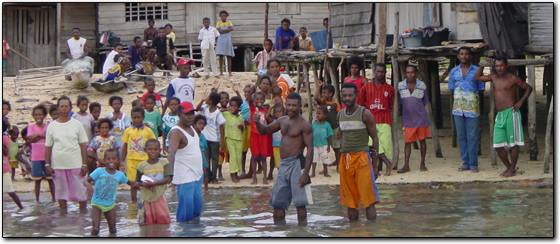
Proop Island
Our boat cruised the straight between Rumberpon and the mainland. We landed on a sandy beach on small, uninhabited Proop island. A few raised bamboo huts would provide a sheltered place to sleep. We gathered wood and started a cooking fire. Across the channel, the sun was setting over the forested mountains of the “neck” that connects the bird-shaped “head” of Papua with the mainland. Late that night it started raining and by morning the wind blew chilly with driving rain. Disappointed, we snorkeled along the beach, looking for Dan’s shorts that had gone missing from the boat during the night. The crew gathered a pile of green coconuts to take along.
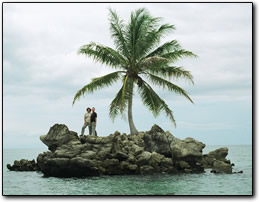 |
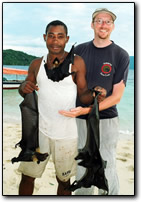 |
Right off the beach was a nice coral wall to snorkel. The weather cleared, and we decided to camp another night on the island, giving us time to spend the whole day snorkeling around the nearby islands. The “boys” kept talking about bats living on one of the nearby islands. Why were they so excited about bats? We cruised the limestone islands looking for their location. We landed at one rocky beach. Hendrik and Abner took their BB gun and went ashore while we snorkeled in the delightfully clear water. Soon we heard a terrible screeching coming from the nearby trees. When we looked up, the sky was full of large, flapping bats. Hendrik and Abner returned, beaming, with dead bats draped over their shoulders. Abner held a live baby bat in his hands. Hendrik had one too, but as he reached the boat the baby fruit bat chomped down on his finger, wiggled free and flapped away. Abner brought his bat into the boat and hung it from the awning. Staring at us with its large black eyes, it emitted a squeaky, chirping cry for help. Anne took it in her hands and stroked its soft, furry chest. They had shot the mother, not knowing it was hiding a baby in its wings. Abner wanted to keep the bat to tame it. Excited, he said that if you gave it food and a place to perch, it would become a “house bat” when it became mature.
 |
 |
The sun came out. We found a great place to snorkel, a garden of healthy coral. Eric spotted a small black-tipped reef shark in the shallow water. Anne saw a turtle. The crew took their spear gun to hunt for fish. The underwater coral shimmered in delicate blues and greens. That night, the crew grilled fish for us, keeping the bats for themselves. After roasting them over the fire, they chopped up the bodies into small pieces and boiled them in a pot over the fire. Some fisherman joined us in the camp. Anne and Abner fed the baby fresh green coconut, christening it “Senin” (Monday). Watching with its big eyes, the bat licked the soft white flesh with its small tongue. Senin, squeaking now and then, climbed up into the rafters of our hut. We thought it would be safe there for the night. Looking for a morsel of bat meat, we sifted through the pot, pushing aside the bony claws and rubbery wings. It had a strong, gamey taste.
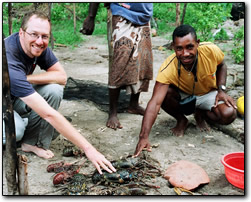 |
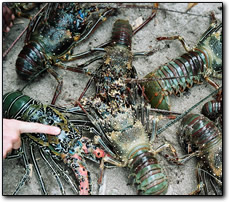 |
When we awoke the next morning, the fishermen had returned with a load of lobster. Dan insisted on buying a couple for dinner, and convinced us to get one as well. Once the price was settled, the lobsters were packed with sand and put in a cardboard box. Senin had disappeared. Abner, worried, looked everywhere in vain. We thought that the camp dog might have eaten the baby bat during the night when it climbed down from the hut to escape. There was nothing more we could do.
